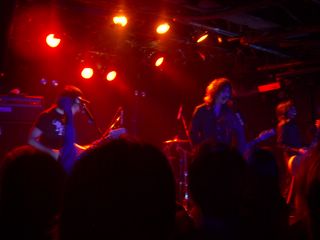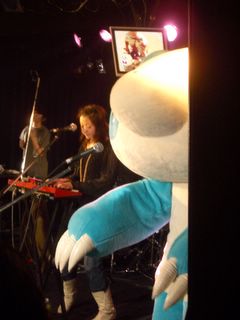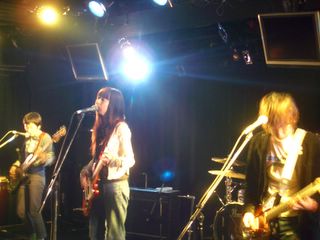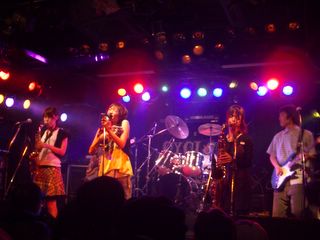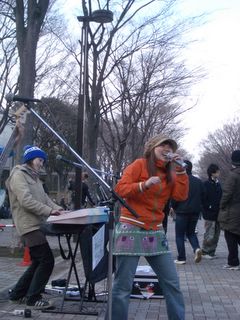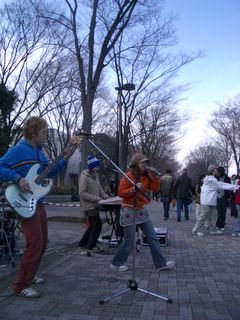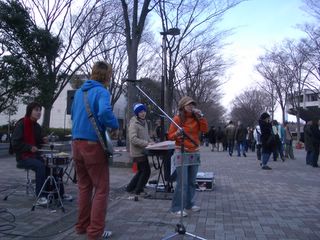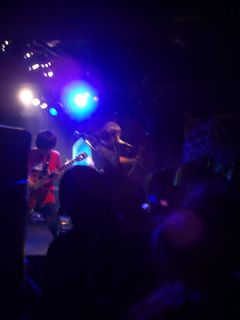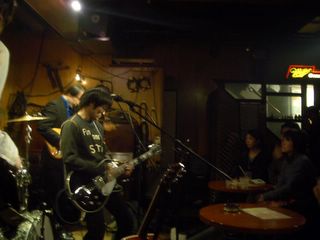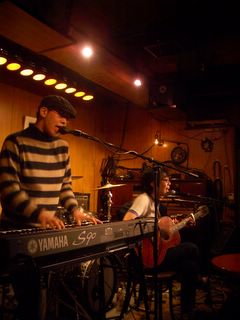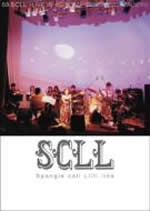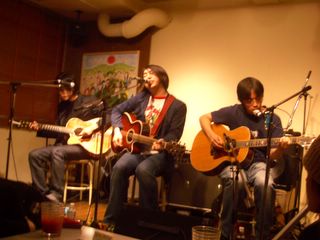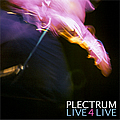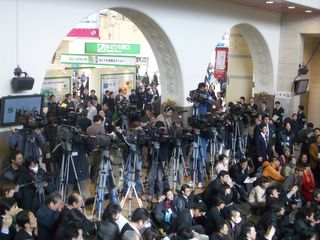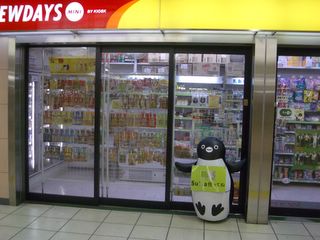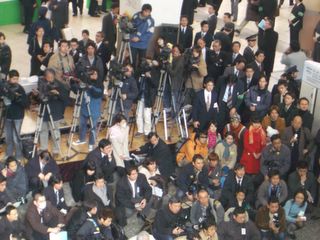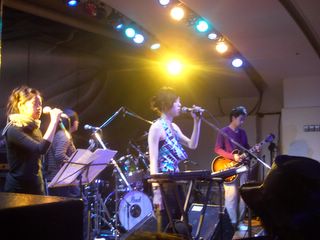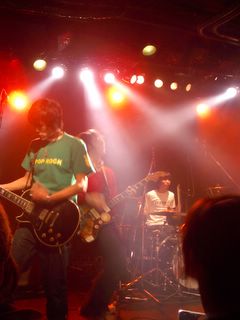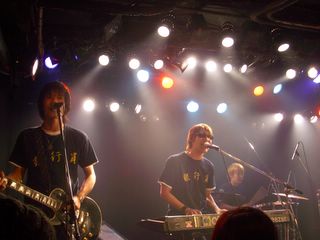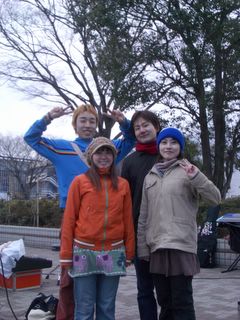
Orange Plankton: from the left, bassist Tsuji-, singer Yumi, drummer Tamarou, and pianist Yuki.

I interviewed members of Tokyo piano pop band
Orange Plankton more than a year ago for a project, but so far the project hasn't seen the light of day. In the meantime I've decided to share some of what I talked about with the group in Japan Live. The interview took place right after their third album
Fanciful Garden came out, but before the release of their latest album,
Wakusei Note (which is my favorite album of 2004). It was a long conversation, so I've trimmed it down to just the parts talking about music-making and the origins of Orange Plankton.
***
JAPAN LIVE: I've heard that the 'orange' in Orange Plankton refers to the Japanese orange from Ehime prefecture [in western Japan, where Yumi is from]. Is that true?
YUMI: Yes. And also, it's the color of the sun. And with that sunlight, we make the plankton multiply. That's the image.
JAPAN LIVE: How was the band Orange Plankton formed?
TSUJI-: Originally when we were in Osaka we had one other member who played the guitar, and the guitarist and I were in a (rock music) club in college, and we decided to form a new band. So we put up flyers seeking other band members at various musical instrument stores and practice studios, and the people that responded to the flyer became the band.
JAPAN LIVE: What was your first impression of each other?
YUMI: It was my first time in a band, and I had this image of band people having bleached blond hair and wearing lots of pierced jewelry and I was expecting those sorts of people in the band, but then Tsuji- showed up, and I thought, 'How simple!'.
YUKI: I also thought (looking at the other band members), 'simple'. Yumi looked very child-like. But when I met the other four band members they subjected me to a barrage of questions, and I got the feeling that these are pure, serious people.
JAPAN LIVE: What made you decide to be in Orange Plankton?
YUKI: I quite simply wanted to play the piano in a band. [Yuki is a classically-trained pianist.] I had a strong desire to play in a band, but only recently I've started to realize what I really want to do. At first, I thought we might be doing more intense music. What we ended up doing isn't exactly quiet music, but it is a band centered on the piano as I wanted.
TSUJI-: When I decided around high school that I want to be in a band, I liked hard rock and would copy bands like Queen, but when we formed this band, I thought we should do music with originality, like Radiohead. Now we don't aim to be like any particular artist. We try to create our own sound.
TAMAROU: I started playing the drums when I was in college, and I was covering well-known songs in a college club, and I was also in another band before I joined Orange Plankton but they weren't that interesting. And then I met Orange Plankton and they had this atmosphere that I'd never seen anywhere else, and that came out in their music too, and I thought 'this is interesting' and I decided to join them.
***
JAPAN LIVE: What do you find is most difficult about being in a band?
YUMI: I sometimes feel that I want to sing a little more this way or that but I'm not able to, or I want to make the sound a little different but I'm not able to express that to the others. When it's like that, sometimes practice does the trick, but other times I need to try to figure out what exactly it is I want to do. That's a difficult thing.
JAPAN LIVE: How do you overcome the difficulties?
YUMI: First, so I know what I want to say, I try things like drawing a picture, and once I know what it is I'm looking for, I communicate that to the other members, again, doing various things such as writing it out or drawing pictures.
JAPAN LIVE: Do you understand what Yumi is trying to express with her pictures?
YUKI: Yes, gradually I've come to understand them. Though at first I didn't at all.
TSUJI-: One song we are working on now ['Iwa Kaesu Kaze No Oto' in their
Wakusei Note album], Yumi's image of it was of the Mongolian steppe, but I didn't really understand what she was trying to express just looking at the lyrics alone, but then she drew a picture of her image and showed it to me. It was a picture of a girl standing alone in a great field, with a big tree next to her, and when I saw that drawing I was able to get a better sense of what sort of music to play.
***
JAPAN LIVE: How do you create your lyrics?
YUMI: When I write the music to songs myself, I come up with the lyrics at the same time that I create the music. Also, after I read a book or watch a movie or meet someone, I get an impression and I write lyrics to express that impression.
Besides me, Tsuji- and Yuki also write the music to songs, and when I do the lyrics for their songs I attach a lot of importance to the impression I got when I listened to the music for the first time. That lets me write words that aren't inside me.
JAPAN LIVE: When do you write lyrics?
YUMI: Mostly I write at night. I write when it's late at night and it's very quiet.
JAPAN LIVE: Many of your songs use colors as imagery, for example 'Akai Aka' ['A Crimson Red'] and 'Midori No Kotori' ['A Little Green Bird']. Do you consciously use colors as imagery in your songs?
YUMI: I've been told before that I use color a lot. It's not a conscious thing, but colors make it easier to create an image, and I end up using them a lot.
JAPAN LIVE: You also use 'garden' often, for example, in the title of your album [Mizu no Niwa literally means 'Garden of Water', though it's been translated into English by the band as 'Fanciful Garden'.]
YUMI: I try to use words that let people form different images. In the case of colors, people get different images from the color red, but they do get an image. A garden is the same sort of thing.
JAPAN LIVE: Does a garden have a special image for you?
YUMI: It has an image of a partitioned space where anything can be created. I always have an image of there being a garden in my mind.
JAPAN LIVE: What do you mean by 'Garden of Water' [the literal translation of Orange Plankton's third album]?
YUMI: 'Garden of Water' is, well, Orange Plankton's music is a partitioned thing, and when someone listens to Orange Plankton, it's like a garden that we want people to enter. Also, by naming it 'Garden of Water', it helps expand a person's image, though everyone will have a different image, with some maybe thinking of, say, an underwater metropolis.


